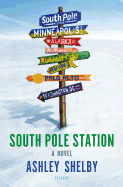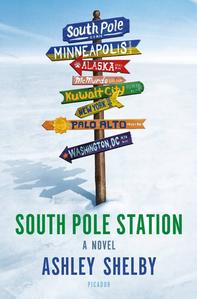
 The Amundsen-Scott South Pole Station Guide welcomes Cooper Gosling, an artist in residence, with the fact that the average annual temperature is -56.7 degrees Fahrenheit. She'd already been vetted for a grant: subjected to an exam ("True or false: I prefer flowers to trucks"), questioned about why she wants to paint in Antarctica and treated to a trust-building exercise involving Tabasco and 7UP. In Ashley Shelby's witty and affecting debut novel, South Pole Station, Cooper joins a group of eccentrics on the ice for a slide into the surreal. There is Sal, an astrophysicist with one year left to prove his cosmological theory; Pavano, a helioseismologist in the pay of big oil and global warming deniers; Pearl, a cook with culinary ambitions; Bozer, the construction chief who sports a Confederate bandanna; Tucker, the calm and cool African American area director; and various other "margin-dwellers" for whom the Pole is the only place they feel at home.
The Amundsen-Scott South Pole Station Guide welcomes Cooper Gosling, an artist in residence, with the fact that the average annual temperature is -56.7 degrees Fahrenheit. She'd already been vetted for a grant: subjected to an exam ("True or false: I prefer flowers to trucks"), questioned about why she wants to paint in Antarctica and treated to a trust-building exercise involving Tabasco and 7UP. In Ashley Shelby's witty and affecting debut novel, South Pole Station, Cooper joins a group of eccentrics on the ice for a slide into the surreal. There is Sal, an astrophysicist with one year left to prove his cosmological theory; Pavano, a helioseismologist in the pay of big oil and global warming deniers; Pearl, a cook with culinary ambitions; Bozer, the construction chief who sports a Confederate bandanna; Tucker, the calm and cool African American area director; and various other "margin-dwellers" for whom the Pole is the only place they feel at home.
South Pole Station, told from various viewpoints, always circles around Cooper, who was raised, along with her brother, on tales of Polar exploration. After his suicide, she feels drawn to Antarctica. Tucker intuits that Cooper was "coming from a place of strength. She wanted to go to the Pole for the reason he had gone: to avoid becoming a tragic figure." The tension in the novel, aside from extreme weather conditions and personal interactions, comes from the opposition to Pavano. The scientists go out of their way to thwart him, which ultimately results in an accident involving Cooper, and the threat by several congressmen to withdraw funding.
Shelby makes serious statements about scientific quests, climate change, politics and people in extremis, but it's the "Polies" who undergird the story. In months of perpetual night, they live in a miniature parallel universe, a place where "the water swishing around in the station toilets might be made from snow that had fallen in the fifteenth century." There's also plenty to catch Shelby's satiric eye besides politics: the literary novelist whose "work deals with the cartographic imperative" or the dancer who hopes to choreograph a show "based on the mating rituals of the hydrocarbon seep tubeworm," but runs into difficulties interpreting its vascular plume.
Cooper says, "I like it here because this isn't the world. It's somewhere else." But the world inevitably intrudes, and as things begin to fall apart, the Polies band together and take a stand. She thinks of what Apsley Cherry-Garrard (of the ill-fated Scott party) wrote: "If you are a brave man you will do nothing; if you are fearful you may do much, for none but cowards have need to prove their bravery." As Cooper becomes a true Polie, she realizes another truth, voiced by Bozer: "We're all here because of some s**t. Everyone's got it, but you ain't got to be alone in it." With South Pole Station's satire, science, wry wit and warmth, Ashley Shelby has written one of the best novels of the year. --Marilyn Dahl
Shelf Talker: A blocked artist gets a grant to paint in Antarctica, and finds both inspiration and family among the "margin-dwellers" who call the ice their home.

